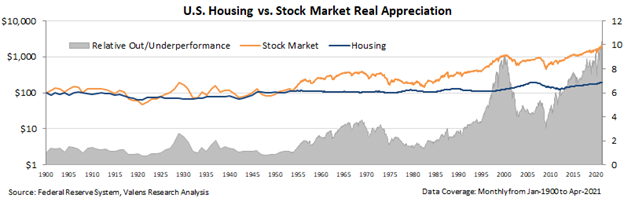This controversial investment class just became more complicated

Home prices are up 14.6% from a year ago. The At-Home Revolution has supercharged America’s housing market, particularly in rural markets.
The pandemic forced people out of crowded cities into suburban settings, and the housing supply simply can’t keep up with demand, no matter how many houses are being built or re-sold.
Today, we will discuss whether this trend means real estate is becoming a better investment, or if investors should stick with equities.
Investor Essentials Daily:
The Monday Macro Report
Powered by Valens Research
According to the closely followed S&P/Case-Shiller U.S. National Home Price Index, annual gains in the U.S. housing market have reached their highest levels in over 30 years.
With housing near record lows, the mismatch of supply and demand continues to drive prices higher – and not only in the U.S.
As The Economist reports, an index of average real home prices in 25 developed countries has risen at its fastest pace in over a decade, led by 22% gains in New Zealand.
These rapid gains have begun to make some investors and policymakers uneasy, with memories of the prior decade’s housing crisis still fresh on their minds.
Yet, with strong bank balance sheets and heightened mortgage lending standards, concerns about financial stability risks stemming from the housing market are largely overblown.
But that doesn’t mean you should invest your money in real estate over the S&P 500.
The past year of real estate gains may entice speculative investors – those looking to buy houses and sit on them for appreciation – into the housing market.
While we understand the thought process, the recent run up in prices warrants a reminder of how to think about real estate purely as an investment, and why it almost never wins.
As history – and the recent past for that matter – makes clear, the U.S. stock market has consistently outperformed real estate in terms of price appreciation.
From April 2020 to April 2021, while housing prices were up 14.6% in America, the Dow Jones Industrial Average logged a gain of 58.3%, the S&P 500 increased by 62.8%, and the NASDAQ Composite registered a remarkable 83.1% advance.
In fact, returns in the stock market have been around 9 times higher than those in real estate over the past 100 years, quite a wide margin of outperformance. See for yourself below…
This is not to mention the risks inherent to real estate investing compared to a simple passive investment in the stock market.
First off, most investors in real estate finance their purchases with leverage (i.e., borrowed money), magnifying both gains and losses. For example, if an investor takes out a mortgage to finance an investment property and pays the typical 20% downpayment, the leverage ratio on the investment is five-to-one.
This means that a 10% increase or decrease in the value of the property will correspond to a 50% gain or loss, making for a riskier investment.
Furthermore, investing in real estate also often requires giving up the benefits of diversification.
When you buy a home or property in the New York City area for example, the value of your investment becomes beholden to the city’s and state’s economic conditions.
If the economy in NYC starts to slow, you may experience a substantial loss on your investment, magnified by any leverage used to make it in the first place.
Thus, unlike an investment in the S&P 500, which is composed of a diversified list of businesses including real estate, an investment in real estate comes with a greater degree of concentrated risk.
Finally, real estate investment must be thought of as more like a business than an investment.
Owners must commit time to such concerns as finding the right local market to invest in, establishing reasonable financing, hiring service providers from property managers to plumbers and electricians to fix eventual problems, and managing complicated legal and tax issues.
As you can probably imagine, this is no easy task for the novice, leaving professional real estate investors with the advantage and most of the potential profit.
This discussion is totally separate from the personal decision many families make whether to buy or lease their home. There are innumerable financial and lifestyle factors that are totally separate when it comes to a family’s home. For all of these reasons, we caution investors looking to replace stock investment with real estate.
While real estate investment can be a lucrative business for those willing and able to spend the time to obtain the required knowledge, for most investors, there is a strong argument to be made for steering clear of real estate and focusing on the higher-performing stock market.
Best regards,
Joel Litman & Rob Spivey
Chief Investment Strategist &
Director of Research
at Valens Research





